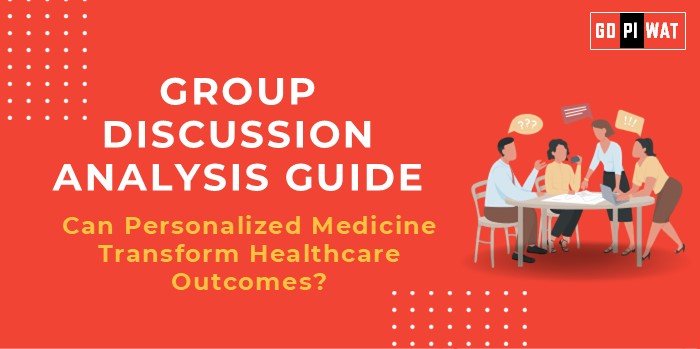📋 Group Discussion Analysis Guide: Can Personalized Medicine Transform Healthcare Outcomes?
🌐 Introduction to Personalized Medicine
💡 Opening Context: “Personalized medicine, blending genomics, data analytics, and precision therapy, is poised to revolutionize healthcare by tailoring treatment to an individual’s genetic makeup and lifestyle.”
💡 Topic Background: Originating from advancements in genomics and biotechnology, personalized medicine seeks to replace the “one-size-fits-all” model. It has gained traction due to breakthroughs in genome sequencing, big data, and artificial intelligence.
📊 Quick Facts and Key Statistics
- 🧬 Human Genome Project Completion: 2003 – Unlocked potential for precision medicine.
- 💰 Global Precision Medicine Market: Valued at $59 billion in 2022, expected to grow at 10% CAGR by 2030.
- 🔬 Cost of Genome Sequencing: Dropped from $1 billion (2001) to under $1,000 (2024), enabling broader accessibility.
- 💉 Cancer Treatments Success Rate: Increased by 30% with genomics-based therapies.
👥 Stakeholders and Their Roles
- 🏥 Healthcare Providers: Develop and implement tailored treatment plans.
- 🧪 Biotech Companies: Innovate diagnostic tools and therapies.
- ⚖️ Governments: Regulate and fund personalized medicine initiatives.
- 🧑🤝🧑 Patients: Drive demand through growing awareness of genomics.
- 🎓 Academia and Research Institutions: Advance foundational research.
🏆 Achievements and Challenges
🏅 Achievements
- 💊 Cancer Therapies: Targeted drugs like Trastuzumab improved survival rates for HER2-positive breast cancer.
- 🧬 Rare Diseases: Breakthroughs in treating genetic conditions like cystic fibrosis with drugs like Ivacaftor.
- 💉 Pharmacogenomics: Enhances drug efficacy and minimizes adverse reactions.
⚠️ Challenges
- 🔒 Data Privacy: Ethical concerns about genetic data usage.
- 💰 Access Disparities: High costs limit global adoption.
- 🏥 Infrastructure Gaps: Lack of advanced healthcare facilities in developing nations.
🌍 Global Comparisons
- 🇺🇸 United States: Precision Medicine Initiative (2015) catalyzed research.
- 🇨🇳 China: Leads in genetic data aggregation, supporting rapid advancements.
📖 Case Study: India’s GenomeIndia project aims to sequence 10,000 genomes to enhance local relevance.
🗣️ Structured Arguments for Discussion
- ✅ Supporting Stance: “Personalized medicine can significantly improve healthcare outcomes by addressing individual variations, thus enhancing treatment efficacy.”
- ❌ Opposing Stance: “The high costs and data privacy concerns may hinder its widespread adoption, especially in low-resource settings.”
- ⚖️ Balanced Perspective: “While the benefits are undeniable, equitable access and ethical safeguards are essential for sustainable integration.”
💬 Effective Discussion Approaches
- 📊 Opening Approaches:
- Statistical Impact: “With the precision medicine market valued at $59 billion, its growth highlights the potential to transform healthcare globally.”
- Case Study Focus: “Targeted cancer therapies like Trastuzumab showcase the life-saving potential of personalized medicine.”
- 🔄 Counter-Argument Handling:
- Ethical Rebuttal: “While data privacy is a concern, advanced encryption and policies like GDPR ensure security.”
- Cost Argument: “Technological advances are continuously reducing costs, paving the way for broader accessibility.”
🔍 Strategic Analysis of Strengths and Weaknesses
- ✅ Strengths: Increased treatment efficacy, reduced side effects, advancements in genomics.
- ❌ Weaknesses: High initial costs, limited awareness, infrastructure gaps.
- 🌟 Opportunities: AI-driven insights, global collaboration.
- ⚠️ Threats: Data misuse, slow regulatory processes.
💼 Connecting with B-School Applications
- 🌐 Real-World Applications: Link to healthcare projects on technology adoption, business models for biotech startups.
- 💬 Sample Interview Questions:
- “How can data analytics drive the growth of personalized medicine?”
- “What business strategies could reduce the costs of genome sequencing?”
- 💡 Insights for B-School Students: Explore healthcare innovation, regulatory challenges, and AI’s role in advancing medical outcomes.


